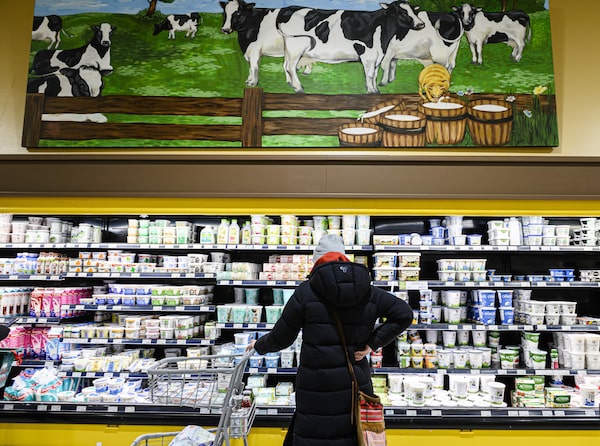
Employees restock shelves at Fiesta Farms independent grocery in Toronto, on Jan., 20, 2022.Christopher Katsarov/The Globe and Mail
Good luck getting the frill out of your bill.
Canadians are already feeling pinched by higher food prices at the grocery store. Everything from fresh fruit to meat is costing us more money. But brace yourselves, my compatriots, our collective sticker shock for dairy staples such as milk and butter is about to get worse.
The reason?
Our feckless federal government is more concerned about placating privileged dairy producers than delivering savings to hurting households. Otherwise, Parliament would have censured the Canadian Dairy Commission for its plan to implement substantial price increases starting next week.
The Canadian Dairy Commission – a Crown corporation that serves as the linchpin of Canada’s pernicious price-fixing system for dairy – will raise the “farm gate” price that producers receive for their milk by six cents a litre starting on Feb. 1.
That means the cost of milk that is used to make dairy products for retail stores and restaurants will increase by an average of 8.4 per cent. The price of butter, meanwhile, is set to jump by 12.4 per cent.
Each year, the commission sets these so-called support prices as reference points for provincial marketing boards. Those provincial authorities then set milk prices in each province.
But this year’s price increase for farm milk will set a new record and will ultimately be borne by Canadians in the form of higher retail prices for dairy products. The farm gate prices for producers only reflect part of those retail prices.
Just how high will consumer prices climb? It will depend on the product.
It’s enraging. Milk, butter, yogurt and cheese aren’t luxury items – they’re essentials on everyone’s grocery list. But instead of raising a ruckus last fall when the commission first announced its intention to hike prices, our parliamentarians stayed mum. So much for championing the public interest.
Although the commission claims higher prices are needed to “partially offset increased production costs due to the COVID-19 pandemic,” critics say the process for calculating increases is opaque.
Are steep price hikes for farm milk and butter justified? Canadians have no way to know for sure.
As The Globe and Mail pointed out in an editorial that the commission offers an insufficient rationale. Its unaudited cost-of-production report includes no raw data and hinges on a random survey of 224 farms.
Canadians deserve better from a Crown corporation.
Inflation is at a three-decade high and we’re already coping with higher prices in all aspects of our lives. Unlike dairy farmers, some of whom are wealthy rural residents in Quebec and Ontario, ordinary people have no way to counteract climbing costs.
Trouble is, MPs across the political spectrum are more interested in preserving their political prospects with this influential voting bloc than championing the interests of everyday Canadians.
Our elected officials have long ignored warnings about how supply management – which also fixes the price of eggs and poultry – is detrimental to consumers.
The Organization for Economic Co-operation and Development has estimated supply management costs Canadian consumers an average of $2.6-billion a year. Another study by the Montreal Economic Institute found supply management pushes up to 190,000 Canadians into poverty.
The last thing that anyone needs right now is to pay even more for food.
Grocery prices climbed again in December, rising by 5.7 per cent on a year-over-year basis, Statistics Canada reported last week. Consumer prices for dairy products climbed 3 per cent, including for fresh milk (3.7 per cent), butter (3.4 per cent), cheese (2 per cent) and ice cream (4.8 per cent).
If there was ever a time for Ottawa to do away with the supply management system for dairy, this is it.
Canadians tend to romanticize the notion of small, family-run farms, but increasingly dairy production is big business. There were only 10,371 dairy farms in 2020, down from roughly 145,000 in the 1970s. That total will continue to decline as industry consolidation continues over the coming years.
Why should more than 38 million people be penalized to protect this small group of business owners?
There’s no doubt that getting rid of supply management would provide Canadians with lower prices, especially if foreign producers were able to sell us a wider array of dairy products.
Currently, our trading partners only have a toehold in the Canadian market. But they’re starting to push back against our protectionist policies.
This month, a dispute resolution panel ruled in favour of the United States over a complaint that it lodged about Canada’s uncompetitive dairy practices – the first enforcement action under the United States-Mexico-Canada Agreement.
The panel ruled Canada is violating the USMCA free-trade pact because of how it allocates tariff-rate quotas, or TRQs, which provide preferential access to our dairy market. Specifically, Canada was admonished for reserving TRQs exclusively for the use of Canadian dairy processors, creating trade barriers for American dairy products. Canada has until Feb. 3 to comply with the findings.
In the wake of that ruling, New Zealand also called on Canada to overhaul its dairy policies.
Canadians shouldn’t have to rely on foreign governments to force Ottawa’s hand on reform.
Our own legislators should have our backs. Dairy-price inflation is hurting Canadians. Parliament’s intransigence on supply management is indefensible.
Your time is valuable. Have the Top Business Headlines newsletter conveniently delivered to your inbox in the morning or evening. Sign up today.
 Rita Trichur
Rita Trichur